by M. C. Jennings | Oct 20, 2022 | Academics, Accounting, Alumni Spotlight, COBA Faculty, COBA Staff, Current Students, Digital Entertainment Technology, Financial Management, Human Resource Management, Management, Management Information Systems, Marketing, Placement stories, Professional Development, School of Information Technology and Computing, Uncategorized
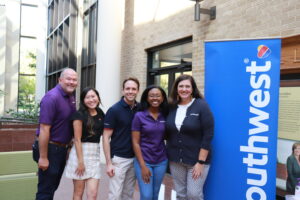
COBA Alums who work at Southwest Airlines recently came to discuss internship opportunities at the company with COBA students. Pictured from left to right are Chris Grubbs (’95), Kristy Ng (’20), Baron Smith (’09), Bethani Culpepper (’19), and Katie Coldwell (’00).
Written by special contributor Lance Fleming
When the College of Business Administration (COBA) unveiled the most significant changes to its curricula in decades, one area of great emphasis was professional development. Those studying the updates and later making the recommendations believed a professional internship would help make COBA students more well-rounded prospective employees when they left ACU.
As Dr. Brad Crisp, the Dean of the College of Business Administration said recently, “… we are placing greater emphasis on professional development by requiring a professional internship in management, marketing, and information systems and offering an internship as an option for accounting and finance majors.”
As the person serving as the director of professional development and internships for COBA, Jasmine McCabe-Gossett said the new emphasis on internships will help make students better equipped to handle real-world practices that they will face when they begin working full-time.
“Students need to take advantage of the unique timing internships can offer,” said McCabe-Gossett, who is in her first year as the Professional Development and Internship Director for COBA. “Students have the distinct opportunity to apply what can feel like abstract theories and case studies to the real world. Internships are insulated and allow students to practice in an environment designed for them to ask questions and fail, whereas, post-graduate opportunities can be far less forgiving.”
first year as the Professional Development and Internship Director for COBA. “Students have the distinct opportunity to apply what can feel like abstract theories and case studies to the real world. Internships are insulated and allow students to practice in an environment designed for them to ask questions and fail, whereas, post-graduate opportunities can be far less forgiving.”
Tim Johnston, the Assistant Dean for COBA, said a student who participates in an internship program in college will have a distinct advantage over students who don’t take advantage of those programs.
“Many years ago, with the contraction of the economy, many students were entering college without a lot of summer work experience,” Johnston said. “One of the top qualities all employers like to access is work ethic. Without a lot of work experience, it was difficult to feel confident about a student’s ability to dig-in and work hard. Many large organizations started internship programs.
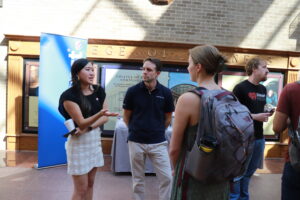
“These programs typically run for 12 weeks during the summer,” he said. “Most are paid and it’s a way for a company to have a long and intense look at the candidates. Many companies only offer full-time opportunities to those students who have completed an internship with their organization. So for many large firms, this is the path into their company.”
When a student is looking for an internship, COBA Associate Dean Andy Little said one thing stands above all when he advises a student on a potential position.
“Fit,” he said succinctly. “In other words, does this organization fit your values and the goals you have set for yourself? Will you get practical experience? What kind of people work there? Is it an industry or market segment that you would like to start your career in?”
McCabe-Gossett agrees that finding an internship in a potential career field is an essential part of finding the right landing spot.
“I encourage students to focus on finding an internship in the industry they imagine as their future career,” she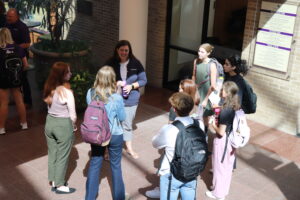 said. “Doing so will allow them to fully immerse themselves so they can determine whether or not their dream industry aligns with their values, work style, etc.”
said. “Doing so will allow them to fully immerse themselves so they can determine whether or not their dream industry aligns with their values, work style, etc.”
The National Association of Colleges and Employers has surveyed employers and determined the following qualities are most important to the potential employers surveyed. In order of importance, those qualities are:
- Problem-solving (critical thinking)
- Teamwork / collaboration
- Professionalism / work ethic
- Verbal and written communication skills
- Digital technology capabilities
- Leadership
- Global / multicultural fluency
“We want our students to demonstrate these competencies and reflect on their current areas of strength and areas where growth is needed,” Johnston said. “Their internship manager completes a formal evaluation that provides feedback on these key qualities.
“Another key advantage we are looking to provide for ACU students is an opportunity to intern with ACU alumni,” he said. “Our alumni teach students how professional excellence provides another avenue to honor God, as we serve in the marketplace.”
If you’d like to know more about internships with COBA, as either an employer or a student, email coba@acu.edu.
by M. C. Jennings | Oct 12, 2022 | Academics, Accounting, COBA Faculty, College Decisions, Current Students, Economics, Faith Infusion, Financial Management, Human Resource Management, International Business, Management, Management Information Systems, Marketing, Professional Development, Uncategorized
Written by special contributor Lance Fleming
The College of Business Administration (COBA) recently undertook what Dr. Brad Crisp considers “the most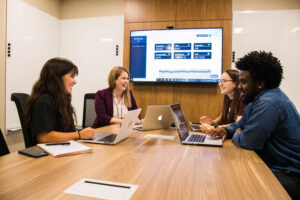 significant change to business curricula at ACU in at least three decades” with revisions to the Bachelor of Business Administration (BBA) majors.
significant change to business curricula at ACU in at least three decades” with revisions to the Bachelor of Business Administration (BBA) majors.
Those changes include updates to the core requirements for all business majors and to the major requirements for each business major, including an analytics track available within each major. The process that was undertaken was extensive and lasted a few years, including input from the COBA Dean’s Council, Visiting Committees, and other external stakeholders.
The members of each of those committees and groups were looking at in-depth benchmarking, analysis, and solution alternatives identified by the BBA Task Force. Those committees undertook extensive discussions on a wide range of proposals from the faculty task force, which was formed in early 2019 and delivered its recommendations later that fall. After the committees did their work, the changes were approved last spring by faculty and administrators at all levels of the university.
The goal of the core revision largely focused on faith and ethics, analytics and technology, and professional development.
“Faith and ethics are central to our identity as a Christian university,” said Dr. Crisp, the Dean of the College of Business Administration, “and we added some ethics content to a required business law course. All business majors will now take a two-course sequence in analytics and can choose a nine-hour or more track in analytics. Finally, we are placing greater emphasis on professional development by requiring a professional internship in management, marketing, and information systems and offering an internship as an option for accounting and finance majors.”

Photo by Jeremy Enlow
Those recommendations and changes are part of COBA keeping up with the pace of change that is currently being seen in the business world, said Andy Little, associate dean for COBA and associate professor of Business Law.
“The pace of change in the business world – and society in general – necessitates some level of change in two dimensions: first within a specific course, faculty need to stay up to date with new developments; and second, from time to time, the curriculum in general needs to be evaluated and potentially updated,” Little said. “It’s easy for most faculty to update specific courses on a regular basis. I’ve added three new readings to my introductory law class, all of which deal with recent developments in the legislature.
“Maybe more clearly, a course like Digital Marketing requires near-constant revision, just to keep up with all the changes in how people and companies use platforms to market products and services,” he said. “To a certain extent, the velocity of change works in favor of a stable curriculum: foundational subjects like Accounting, Economics, and Statistics need to be included in every iteration of a core curriculum over time because those are the building blocks on which much of the business enterprise rests.”
Every major was reviewed and now has more market aligned pathways giving students more direction and professional guidance as they look toward their future profession. As the business world evolves, COBA is continually looking for ways to prepare students both inside and outside of the classroom. We do this through holistic student development, offering foundational business courses and major specific tracks, and including ethics in our offerings. This combination helps us strive to produce graduates who honor God and bless the world.
To learn more about the College of Business at ACU, click here.
by M. C. Jennings | Sep 28, 2022 | Academics, Alumni Spotlight, COBA Events, COBA Faculty, COBA Staff, Current Students, Faith Infusion, Uncategorized
Written by special contributor Lance Fleming
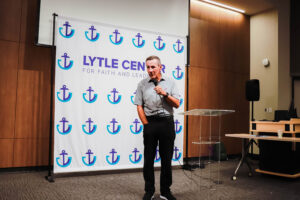 In more than 30 years as the minister at The Hills Church in North Richland Hills, Rick Atchley (’78) has delivered thousands of sermons to millions of people, drawing listeners from near and far to a relationship with Jesus Christ. In Atchley’s tenure with The Hills Church, it has grown to be among the largest Church of Christ congregations in the world, averaging over 5,000 in attendance each week across three campuses.
In more than 30 years as the minister at The Hills Church in North Richland Hills, Rick Atchley (’78) has delivered thousands of sermons to millions of people, drawing listeners from near and far to a relationship with Jesus Christ. In Atchley’s tenure with The Hills Church, it has grown to be among the largest Church of Christ congregations in the world, averaging over 5,000 in attendance each week across three campuses.
As he said when he was named ACU’s Outstanding Alumnus of the Year in 2014, one of the themes of his life and his ministry is to live out Christ’s call to unify and to “bring down walls that God didn’t want up in the first place.”
Atchley spoke to both students and faculty and staff at ACU on Tuesday, September 6th. His address to students was a part of the Lytle Center’s Fall Speaker Series while his exhortation to faculty and staff was a part of the Lytle Center’s second annual Abiding in Christ dinner event. The Abiding in Christ dinner was established in 2021 with a vision of encouraging and challenging faculty and staff in the deepening of their relationships with Jesus in order to better influence and serve students. It should come as no surprise that Atchley had a challenge for each group. A mission to follow Christ no matter the setting or circumstances.
students was a part of the Lytle Center’s Fall Speaker Series while his exhortation to faculty and staff was a part of the Lytle Center’s second annual Abiding in Christ dinner event. The Abiding in Christ dinner was established in 2021 with a vision of encouraging and challenging faculty and staff in the deepening of their relationships with Jesus in order to better influence and serve students. It should come as no surprise that Atchley had a challenge for each group. A mission to follow Christ no matter the setting or circumstances.
At the Abiding in Christ dinner, Atchley contended, that ACU should be a place where students attend to not only grow in academic ability but also in wisdom.
“We know there’s a difference between being intelligent and truly being wise, and that’s why I believe the mission of this university is so critical,” he said to a group of around 200 faculty and staff members gathered in the Brown Family Club Level at Anthony Field at Wildcat Stadium. “Let’s be honest: young people don’t have to come to ACU to gain knowledge on how to be an accountant or how to manage the market. They can gain knowledge at many great universities. What I hope for when they come here is that, along with knowledge, they gain wisdom. They learn to be wise, not just smart.”
Atchley then spent several minutes challenging those in attendance to teach their students to look for wisdom and guidance from above and not from other sources.
“What is the wisdom of the world?” he asked. “It’s the knowledge that looks for truth from within instead of above. It’s the Kool-Aid of this culture. The young people you teach have been immersed in it. It’s all about finding their truth. The world has told them to look inside to find truth.”
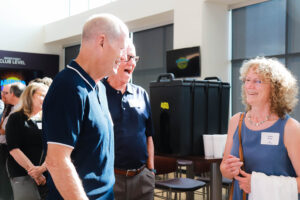 “They don’t have to come here to get knowledge; you’re good at that,” Atchley told the crowd. “You’re good at that. But when they leave with the knowledge you’ve given them, will they be wiser? Will they leave with a worldview that says ‘I’m going to look at life through the lens of the wisdom of Christ? He will be where I get my truth. He will be the framework from which I understand what is right and wrong.’ Will they leave with wisdom, not just knowledge?”
“They don’t have to come here to get knowledge; you’re good at that,” Atchley told the crowd. “You’re good at that. But when they leave with the knowledge you’ve given them, will they be wiser? Will they leave with a worldview that says ‘I’m going to look at life through the lens of the wisdom of Christ? He will be where I get my truth. He will be the framework from which I understand what is right and wrong.’ Will they leave with wisdom, not just knowledge?”
Late in his address to the faculty and staff, Atchley reminded them that they are working and teaching in a society that has been battered by the constant battle between politics and religion. And it’s against that backdrop that ACU faculty and staff must equip students with the wisdom needed to traverse that world, no matter their chosen profession.
“For the Christian educator, the opportunity to prepare students for the world in which they will pursue varied and creative careers must include the role of faith and the pursuit of wisdom,” said Mitzi Adams, Director of Clinical Teaching and Field Experiences in the Department of Teacher Education. “We are challenged to consider how our courses are different from the courses offered at other prestigious universities where students could secure a solid education. At ACU, it must come back to the witness of faith.”
“I think it’s very important for students to hear and experience much more than just knowledge of their field of study,” she said. “At a Christian university, the faith we profess becomes the framework through which we view and experience this education.”
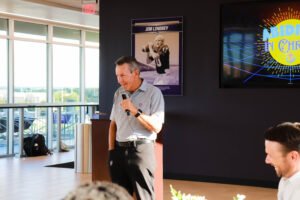 As Atchley pointed out numerous times to the faculty and staff, the prevailing mission of ACU should be to not only equip students with knowledge and wisdom but also the desire to live out their faith in the world around them.
As Atchley pointed out numerous times to the faculty and staff, the prevailing mission of ACU should be to not only equip students with knowledge and wisdom but also the desire to live out their faith in the world around them.
“For a student to walk away from this Christian university without the opportunity to understand and apply where and how faith integrates into their chosen field of study is to have had an important aspect of this education withheld,” Adams said. “If not now, when will our students have the opportunity to be immersed in studies intended to prepare them for excellence in their field? Beyond this, at what other time in the lives of our students will they have the opportunity to be taught by exceptional practitioners, academics, and researchers who are compelled by the Christian faith? Our students are here now. This is an opportunity we have as a faculty to pour into our students not only our professional expertise but also the centering of our faith.”
Before Atchley spoke to the faculty and staff at the football stadium, he met with COBA students, challenging them to choose the battles that matter.
“It’s easy to get passionate and carried away with matters that don’t have much weight,” said Kathryn Crawford, a senior Finance and Management major from Flower Mound. “Instead, we need to recognize the fights that will have an impactful outcome and approach those with our chosen values.”
In addition, his theme with the students was much the same as it would be later with the faculty and staff: that knowledge is easily attainable anywhere but it’s wisdom and obedience in Christ that will make the most impact on the world.
“He made the point that we have to trust the impact of an obedient life,” Crawford said of Atchley. “When things become difficult, the easy way out seems so attractive. But this path does not guarantee obedience. Time and time again, scripture shows us our convictions will cause us to face difficult things in our lives. Choosing obedience may not be easy but the impact we can unknowingly have on the Kingdom is far greater than the temporary adversity we might face.”
Crawford said Atchley’s message to students about integrity and faith in the workplace resonated with her because he put special emphasis on how important the choice will be.
“As a student at a Christian university, it becomes easy to rely on circumstances and surroundings to motivate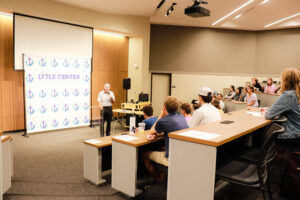 my faith,” she said. “However, I know this won’t necessarily be the case when I emerge into the workforce as a young professional. I value my faith deeply but have not been in many environments that challenge or counter my beliefs. I left the message feeling encouraged to stay true to my values regardless of circumstance and recognize how much of a difference it can truly make if I choose to let it.”
my faith,” she said. “However, I know this won’t necessarily be the case when I emerge into the workforce as a young professional. I value my faith deeply but have not been in many environments that challenge or counter my beliefs. I left the message feeling encouraged to stay true to my values regardless of circumstance and recognize how much of a difference it can truly make if I choose to let it.”
The Lytle Center for Faith and Leadership exists to foster environments for individuals to grow in faith and character, equipping them with cutting edge leadership competencies, and developing them to be ambassadors of hope, peace, and life in their workplaces. The Lytle Center Speaker Series and the annual Abiding in Christ dinner events are just one example of the ways the Lytle Center strives to encourage and equip the students, faculty, and staff at Abilene Christian University. More information about the Lytle Center can be found by clicking here.
by M. C. Jennings | Sep 6, 2022 | Academics, COBA Faculty, College Decisions, Faculty Testimonials, Faith Infusion, Management Information Systems, Uncategorized
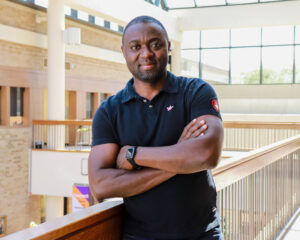 Written by special contributor Lance Fleming
Written by special contributor Lance Fleming
Growing up in Cameroon as the oldest child in a family of five, Dr. Joseph Manga never imagined where his life would take him.
Four different universities for undergraduate, graduate, and doctoral work, as well as tutoring and teaching experience, have all been part of the experience. And this past summer, it led him to Abilene Christian University and the College of Business Administration where he is teaching Management Information Systems.
Manga now joins the full-time faculty as a tenure-track assistant professor of Information
Systems and Management Science. None of this was what Manga expected to be his life’s work
while living in Cameroon. But as he would come to learn, God had other plans for his life.
“As we know, many may be the plans in a man’s heart, but the Lord determines the end,” he
continued. “I began with Mathematics, did a little bit of Computer Science, and then moved on
to business (MIS). This all worked out because I didn’t just want to be crunching numbers and
not know how to interpret them. So, I developed my love for learning from my personal
experience. As an introvert, I thought that doing something that would keep me from talking to
people would be great. That’s why I’m so passionate about research. That was all my plan. But
God’s plan was to send me to love and talk to people.”
Knowing all of that, it still took a chance conversation with a friend that pointed him toward
teaching and meeting the needs of young people.
“I vividly remember sometime in 1998 a friend walked up to me and said, ‘I see you as a
teacher,’ “ Manga said. “I didn’t want to hear that because I never wanted to teach, partly
because of my personality. But as I applied myself to learning, I realized there is more to
teaching than just transferring knowledge. It involves mentoring and discipleship, which are
godly assignments that we are called to fulfill. I believe that teaching brings transformation to
many when it is done in a godly way. That’s why I’m excited to be part of a family and
community that focus on raising a holistic generation in terms of spiritual academic formation,
who will, in turn, move on to serve and transform their world.”
He’s also motivated by the memory of his father, who passed away last January. Manga is the
first person in his family to attain a doctorate, and he attributes his decision to reach the
highest level of education to his father, who worked as a janitor at the university Manga
attended in Cameroon.
“My dad was a strong motivator and proponent for pursuing education, which is a passion for
me now – to see young people educated,” Manga said. “As a janitor, my dad would wake up
very early to go clean the classrooms before students started classes. I still remember one
instance when my dad’s supervisor verbally demeaned him, and I felt bad. But I decided to get
to the highest level of education and use it to honor the janitors who keep our work
environment clean. It was an awful life experience, but it served as a challenge to the
educational experience I have today, which I see as a blessing.”
Manga earned his Bachelor of Science from the University of Buea in Cameroon before earning a
Master’s of Business Administration from Midwestern State University in 2014, a Master of
Science in Management Information Systems from the University of North Texas in 2018, and
finally his Ph.D., in Business Administration from the University of Texas-Rio Grande Valley in
2022.
During all of his academic work, Manga has continued his research in several different areas of
management information systems, technology, information security policy compliance,
business analytics, health information technology, cyber security, and many others.
“Research is a passion,” Manga said. It’s one way to apply my background knowledge in
Mathematics, which is problem-solving. Identifying problems and looking for ways to provide
solutions to these problems is what drives me into research. Finally, I see research as making a
little contribution to academia and giving back to the community.”
Manga has also worked as a Men’s Ministry Coordinator at Abundant Grace Community Church
in Edinburg and as a tutor while in Wichita Falls. And he’s kept up with a family that includes
wife Clarise and four children: Abijoy (9), Solien-Pearl (6), Zoe-Ann (5), and Joe-Praise (4), all of
whom he calls “inquisitive disciples.”
And now the family of six has found its way to Abilene and ACU where Manga is ready and
willing to serve as God leads.
“I am passionate to serve, especially in an environment that aligns with one’s beliefs and
values,” he said. “When the opportunity opened to be part of a culture and institution that
trains godly business leaders in whatever capacity they find themselves, I was glad to jump on
it. God opened this door and I love to follow His lead.”
by M. C. Jennings | Jul 6, 2022 | Academics, COBA Faculty, Current Students, Uncategorized
Travel helps you realize that no matter how much you may think you know, there’s always more to learn.
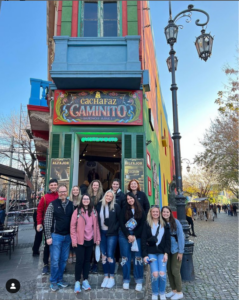 Those who have been fortunate enough to travel abroad know they will return changed people. Traveling to another culture for an extended period of time leads us to see humanity from a new perspective. It also helps us see ourselves as cultural outsiders, where the language, food, clothing, and ways of thinking may all be very different than our ingrained expectations. Hopefully, a study abroad experience is ultimately humbling, as we see the way God moves in different cultures and places.
Those who have been fortunate enough to travel abroad know they will return changed people. Traveling to another culture for an extended period of time leads us to see humanity from a new perspective. It also helps us see ourselves as cultural outsiders, where the language, food, clothing, and ways of thinking may all be very different than our ingrained expectations. Hopefully, a study abroad experience is ultimately humbling, as we see the way God moves in different cultures and places.
This summer, Professors Andy Little and Jim Litton led a COBA Study Abroad trip with 8 students to Montevideo, Uruguay. They also took an extended side trip to Argentina, and the students spent their free weekend at Iguazu Falls on the border of Argentina and Brazil. Students were able to receive course credit for ENTR 419 (Global Entrepreneur) and BLAW 365 (Law and Entrepreneurship).
COBA partnered with Universidad ORT, a local Uruguayan university, to arrange for company visits and cultural excursions. The ACU group met with several local startups: GeneXus, a software development company, Verdeagua, a hydroponic farming company, and Qualabs, a video software development company. The group also hosted a diplomat from the U.S. Embassy at the ACU house in Montevideo, toured the Uruguayan Congress, met with consultants from the Montevideo office of PwC, and got to know leaders of two government agencies that offer grants to start-ups.
 Senior management major Taylor Walling was one of the students traveling with the group and was moved by their visit to Verdeagua. She said, “One of the most memorable visits for me was with a company called Verdeagua. They are the largest producer of hydroponic vegetables in the country. We got to tour their facility with the founder of the company, who has been working there for 20 years. I learned a lot from this experience by seeing the passion the founder has for what he does. He continually talked about what they were doing to make their company better and to grow it, which really demonstrated an entrepreneurial mindset we all wanted to learn about. The company visits were a great way to see how business in Uruguay operates.”
Senior management major Taylor Walling was one of the students traveling with the group and was moved by their visit to Verdeagua. She said, “One of the most memorable visits for me was with a company called Verdeagua. They are the largest producer of hydroponic vegetables in the country. We got to tour their facility with the founder of the company, who has been working there for 20 years. I learned a lot from this experience by seeing the passion the founder has for what he does. He continually talked about what they were doing to make their company better and to grow it, which really demonstrated an entrepreneurial mindset we all wanted to learn about. The company visits were a great way to see how business in Uruguay operates.”
Why travel to Montevideo with students? Little says it’s because “Montevideo is a hidden gem in Latin America, and an outstanding place for business and technology students to study abroad.” The experience of being immersed in a foreign culture provides students with unique experiences that will enhance their future education and work skills. Students learn more conversational Spanish and are able to interact with business professionals and entrepreneurs from a very different culture than America – providing valuable knowledge to anyone interested in working globally in the future. In addition, they’re able to gain insight about themselves and the world around them by living in another culture, even for such a short time.
Walling agrees with that sentiment. “I think the unique experiences of visiting different companies in Uruguay will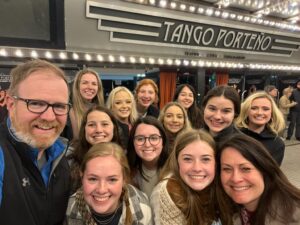 enhance my education and work experience in the future. I enjoyed learning about concepts and ideas in the classroom and then getting to see the ways it was all applied in actual companies. Hearing the leaders at these companies was beneficial to me in understanding how they operate business. One interesting thing was that we talked to a couple of companies about their working relationship with US companies. This piece of information could really help in my future career if I were to work with other countries in my job.”
enhance my education and work experience in the future. I enjoyed learning about concepts and ideas in the classroom and then getting to see the ways it was all applied in actual companies. Hearing the leaders at these companies was beneficial to me in understanding how they operate business. One interesting thing was that we talked to a couple of companies about their working relationship with US companies. This piece of information could really help in my future career if I were to work with other countries in my job.”
Studying abroad doesn’t just broaden students’ educational and vocational opportunities. It also broadens their relationships with their classmates and professors. Walling said, “Studying abroad is very different from the typical classroom setting in a multitude of ways. One of the things that stood out to me most was the relationship that we, as students, got to build with each other and with the professors and their families. Instead of just going to class and hearing our professors lecture we got to share meals with them and experience new things. Through Study Abroad I feel like I gained a lot of wisdom from my professors as they shared stories from their experiences and as they listened to our dreams for the future.”
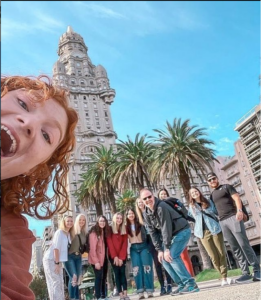 The experience doesn’t just change students. It also is a formative experience for the faculty traveling with them. Little said that he learned more about Uruguay, Argentina, and the Rio de la Plata region and, “I got to spend several weeks with 8 amazing students. Diego Bravo, ACU’s local site director, continues to be a strong friend.”
The experience doesn’t just change students. It also is a formative experience for the faculty traveling with them. Little said that he learned more about Uruguay, Argentina, and the Rio de la Plata region and, “I got to spend several weeks with 8 amazing students. Diego Bravo, ACU’s local site director, continues to be a strong friend.”
Walling encourages any student thinking about studying abroad to “go for it!” She continued, “And if you are a student who has never considered it, I would recommend you look into it. At the start of my college career, I told myself that studying abroad wasn’t for me. Now I can confidently say that it was an experience that I will always remember and that I will take the lessons I learned into my future career. The one lesson that stands out to me is to go for the things that might bring fear because you never know where it might lead you. I am glad I did not let my fears and worries get in the way of going to Study Abroad because of the amazing experiences I had during my time in Uruguay.”
To learn more about ACU Study Abroad opportunities, click here.
by M. C. Jennings | May 19, 2022 | Academics, Accounting, Alumni Spotlight, Careers In..., COBA Faculty, Faith Infusion, Financial Management, MAcc, Special Speakers, Uncategorized
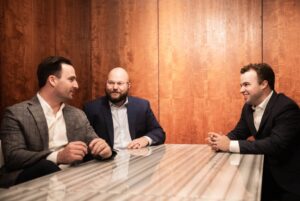
Clay Development Partners Reagan Brown, Shane Seabolt, and Heath Beasley
COBA alums Heath Beasley (’16) and Reagan Brown (’19) are working to make their communities more connected places to live. Brown and partner, Shane Seabolt, founded Clay Development Partners, while Beasley joined their team shortly after. Clay Development Partners is a Dallas/Fort Worth-based real-estate development company focused on the single-family build-to-rent sector of the housing and rental markets. Their mission is “focusing on what it means, and what it takes, to build a true sense of community.” The company strives to “create communities that are designed to promote a true sense of belonging and encourage daily neighborly interactions.”
They recently came to campus to speak with students in the Griggs Center’s CEO (College Entrepreneur’s Organization) weekly chapel about their real estate startup, sharing with students the reason for starting this particular kind of company, how they got started, as well as their previous work experience and how that helped them in this current endeavor. They also gave students a glimpse into their daily work life and how it is very different than what they’d imagined they’d be doing when they were ACU students themselves.
Beasley, with an undergraduate degree in accounting and a Master in Accountancy (’17), serves as the CFO of Clay Development Partners. He previously worked as a CPA for PricewaterhouseCoopers and for a year as the Development Officer for the ACU Athletic Department. Brown, who majored in accounting and finance, serves as President of Clay Development Partners having gained experience in the real estate market as a broker for Moriah Real Estate Company in Midland, TX and as a Development Associate for Republic Property Group in Dallas, TX. We asked Heath and Reagan to share a little about their work experiences and how their time at ACU influenced how they live out their own faith and the company’s mission with the people they come into contact with.
Clay Development Partners. He previously worked as a CPA for PricewaterhouseCoopers and for a year as the Development Officer for the ACU Athletic Department. Brown, who majored in accounting and finance, serves as President of Clay Development Partners having gained experience in the real estate market as a broker for Moriah Real Estate Company in Midland, TX and as a Development Associate for Republic Property Group in Dallas, TX. We asked Heath and Reagan to share a little about their work experiences and how their time at ACU influenced how they live out their own faith and the company’s mission with the people they come into contact with.
How does your faith impact your work?
Heath: I am reminded of God’s grace every single day I am in the office. When challenges arise in the workplace, my faith reminds me that He is in control. Our core job at CDP is to build neighborhoods and communities that are welcoming and accepting; we also believe this is our call as Christians. While we may fall short of this often, we strive to represent Christ in the way we carry out business.
Reagan: It has a huge impact. Every project we develop is focused on bringing people together. We try to design our projects in a way that allows the residents daily opportunities to connect and create meaningful relationships with one another. Ultimately, this opens the door for our residents to experience a kind of genuine fellowship that God wants for us.
Were there any big surprises when you entered the working world after college?
Heath: Honestly, there were not many surprises coming out of school as COBA did a wonderful job preparing me for the working world. However, I will say the biggest challenge when entering public accounting is getting used to the ever-changing work schedule. Some weeks I could work up to 80 hours while others I could work only 20. All the work can be taught and learned over time; however, I don’t think anyone every really gets used to the long hours. The long hours do pay off though as those years prepared me for the role I am in today.
Reagan: The world moves quickly, and it doesn’t slow down. I remember a professor at ACU that used to say “Time is money.” I didn’t think about it very much, but I do now.
How did your time at ACU shape your future?
Heath: ACU shaped my future because it provided me with relationships that will last a lifetime. It is rare for me to go a full week without connecting with at least one ACU alum in some form or fashion. Sometimes we are trying to do business together and other times someone is providing me insight and guidance. ACU is an incredible place, and I am blessed to have had the opportunity to attend. Without ACU, I would not be doing what I am doing today.
Reagan: While I would like to say I was an incredible student, I was incredibly average (ask my professors). When I think back on my time at ACU it was the relationships that carried the most weight. I connect and reconnect with ACU alumni on a weekly basis, many of whom were critical parts of us starting our company.
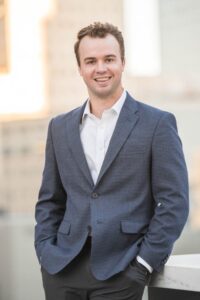
Heath Beasley
What advice would you give to current students to prepare them for their future? What should current students take advantage of while on campus to prepare for their future?
Heath: My advice and what to take advantage of are the same. While still on campus, meet and connect with as many ACU students as you can. For me, these friends were in my wedding, have given me dental advice, have represented my wife and I as we bought our first home, have travelled the world with me, have provided me insight and guidance on how to make strategic decisions, and have also partnered with me in business. Most importantly, I married one those incredible people I met while at ACU.
Reagan: Invest in relationships. Obviously, the coursework is crucial to your degree, but the relationships you invest in during your time at ACU will prove to be more valuable than anything else.
What is your favorite ACU memory?
Heath: It is tough to pick one, but I remember going on a road trip my sophomore year to play baseball against Arizona State and Arizona. It was memorable because we played in the last game at Arizona State’s historic Packard Stadium. The crowd was huge for the game, and it felt special to be a part of history. Later in that same trip we ended up beating the University of Arizona in Tucson, this was our first win against a power conference in our first year of being a Division I program. We did not win a lot while I was there so that win will always stick out to me as a great memory.
Reagan: Galaxy Sing Song (Sweep Song) 2019
Did you have a favorite professor? If so, who were they and why were they a favorite?
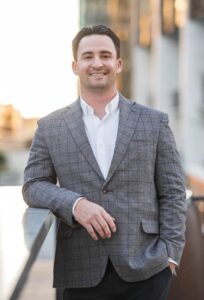
Reagan Brown
Heath: It is tough to pick one as all of them impacted me in a positive way. Dr. Little taught me how to not take things too seriously and how to identify the aspects of a business I should really focus on. Professor Fowler gave me real life examples of how companies apply accounting principles and standards. Dr. Stovall taught me how to operate a company ethically and to always do right even if it is not necessarily the easy route. Dr. Golden’s marketing class was the most fun I’ve had in a classroom. Dr. Taylor spoke about scripture with a conviction I have heard from few others.
Reagan: Professor Fowler was my favorite. Fowler once told me, “Someday you are going to be sitting in a meeting with your boss. Your boss will say, ‘Someone needs to go get some coffee.’ For the first few years of your career, your name is Someone.” Paying your dues early is important. I never forgot that.
What would you say to a prospective student who was trying to decide if they should attend ACU?
Heath: ACU is a place for people to stand out and to have a more personal education. The smaller classes give you a better opportunity to learn and interact with your professors while also making it easier to connect with your classmates as you all work through the same course track. I had classes with the same core group from my freshman year all the way through the graduate program. We all got comfortable studying together, encouraging one another, and learning from each other. ACU has a culture perfectly suited for someone who is looking to surround themselves with students/professors who will make them better.
Reagan: You won’t find a more well-connected community than ACU. I have various childhood friends who attended larger state schools, and they are consistently amazed at the amount of people I am able to connect with because of my time at ACU. It is a special place.
The vison of the College of Business Administration is to inspire, equip and connect Christian business and technology professionals to honor God and bless the world. As Heath and Reagan strive to live out that vision in their company, with the communities they are working to build and connect, and in giving back of their time and advice to current ACU students, we see that vision lived out in them. We’re thankful for alumni who seek to serve the world around them and make it a better place. As we tell our students, “Go change the world, Wildcats!”

 first year as the Professional Development and Internship Director for COBA. “Students have the distinct opportunity to apply what can feel like abstract theories and case studies to the real world. Internships are insulated and allow students to practice in an environment designed for them to ask questions and fail, whereas, post-graduate opportunities can be far less forgiving.”
first year as the Professional Development and Internship Director for COBA. “Students have the distinct opportunity to apply what can feel like abstract theories and case studies to the real world. Internships are insulated and allow students to practice in an environment designed for them to ask questions and fail, whereas, post-graduate opportunities can be far less forgiving.”
 said. “Doing so will allow them to fully immerse themselves so they can determine whether or not their dream industry aligns with their values, work style, etc.”
said. “Doing so will allow them to fully immerse themselves so they can determine whether or not their dream industry aligns with their values, work style, etc.” significant change to business curricula at ACU in at least three decades” with revisions to the Bachelor of Business Administration (BBA) majors.
significant change to business curricula at ACU in at least three decades” with revisions to the Bachelor of Business Administration (BBA) majors.
 In more than 30 years as the minister at The Hills Church in North Richland Hills, Rick Atchley (’78) has delivered thousands of sermons to millions of people, drawing listeners from near and far to a relationship with Jesus Christ. In Atchley’s tenure with The Hills Church, it has grown to be among the largest Church of Christ congregations in the world, averaging over 5,000 in attendance each week across three campuses.
In more than 30 years as the minister at The Hills Church in North Richland Hills, Rick Atchley (’78) has delivered thousands of sermons to millions of people, drawing listeners from near and far to a relationship with Jesus Christ. In Atchley’s tenure with The Hills Church, it has grown to be among the largest Church of Christ congregations in the world, averaging over 5,000 in attendance each week across three campuses. students was a part of the Lytle Center’s Fall Speaker Series while his exhortation to faculty and staff was a part of the Lytle Center’s second annual Abiding in Christ dinner event. The Abiding in Christ dinner was established in 2021 with a vision of encouraging and challenging faculty and staff in the deepening of their relationships with Jesus in order to better influence and serve students. It should come as no surprise that Atchley had a challenge for each group. A mission to follow Christ no matter the setting or circumstances.
students was a part of the Lytle Center’s Fall Speaker Series while his exhortation to faculty and staff was a part of the Lytle Center’s second annual Abiding in Christ dinner event. The Abiding in Christ dinner was established in 2021 with a vision of encouraging and challenging faculty and staff in the deepening of their relationships with Jesus in order to better influence and serve students. It should come as no surprise that Atchley had a challenge for each group. A mission to follow Christ no matter the setting or circumstances. “They don’t have to come here to get knowledge; you’re good at that,” Atchley told the crowd. “You’re good at that. But when they leave with the knowledge you’ve given them, will they be wiser? Will they leave with a worldview that says ‘I’m going to look at life through the lens of the wisdom of Christ? He will be where I get my truth. He will be the framework from which I understand what is right and wrong.’ Will they leave with wisdom, not just knowledge?”
“They don’t have to come here to get knowledge; you’re good at that,” Atchley told the crowd. “You’re good at that. But when they leave with the knowledge you’ve given them, will they be wiser? Will they leave with a worldview that says ‘I’m going to look at life through the lens of the wisdom of Christ? He will be where I get my truth. He will be the framework from which I understand what is right and wrong.’ Will they leave with wisdom, not just knowledge?” As Atchley pointed out numerous times to the faculty and staff, the prevailing mission of ACU should be to not only equip students with knowledge and wisdom but also the desire to live out their faith in the world around them.
As Atchley pointed out numerous times to the faculty and staff, the prevailing mission of ACU should be to not only equip students with knowledge and wisdom but also the desire to live out their faith in the world around them. my faith,” she said. “However, I know this won’t necessarily be the case when I emerge into the workforce as a young professional. I value my faith deeply but have not been in many environments that challenge or counter my beliefs. I left the message feeling encouraged to stay true to my values regardless of circumstance and recognize how much of a difference it can truly make if I choose to let it.”
my faith,” she said. “However, I know this won’t necessarily be the case when I emerge into the workforce as a young professional. I value my faith deeply but have not been in many environments that challenge or counter my beliefs. I left the message feeling encouraged to stay true to my values regardless of circumstance and recognize how much of a difference it can truly make if I choose to let it.” Written by special contributor Lance Fleming
Written by special contributor Lance Fleming Those who have been fortunate enough to travel abroad know they will return changed people. Traveling to another culture for an extended period of time leads us to see humanity from a new perspective. It also helps us see ourselves as cultural outsiders, where the language, food, clothing, and ways of thinking may all be very different than our ingrained expectations. Hopefully, a study abroad experience is ultimately humbling, as we see the way God moves in different cultures and places.
Those who have been fortunate enough to travel abroad know they will return changed people. Traveling to another culture for an extended period of time leads us to see humanity from a new perspective. It also helps us see ourselves as cultural outsiders, where the language, food, clothing, and ways of thinking may all be very different than our ingrained expectations. Hopefully, a study abroad experience is ultimately humbling, as we see the way God moves in different cultures and places.  Senior management major Taylor Walling was one of the students traveling with the group and was moved by their visit to Verdeagua. She said, “One of the most memorable visits for me was with a company called Verdeagua. They are the largest producer of hydroponic vegetables in the country. We got to tour their facility with the founder of the company, who has been working there for 20 years. I learned a lot from this experience by seeing the passion the founder has for what he does. He continually talked about what they were doing to make their company better and to grow it, which really demonstrated an entrepreneurial mindset we all wanted to learn about. The company visits were a great way to see how business in Uruguay operates.”
Senior management major Taylor Walling was one of the students traveling with the group and was moved by their visit to Verdeagua. She said, “One of the most memorable visits for me was with a company called Verdeagua. They are the largest producer of hydroponic vegetables in the country. We got to tour their facility with the founder of the company, who has been working there for 20 years. I learned a lot from this experience by seeing the passion the founder has for what he does. He continually talked about what they were doing to make their company better and to grow it, which really demonstrated an entrepreneurial mindset we all wanted to learn about. The company visits were a great way to see how business in Uruguay operates.” enhance my education and work experience in the future. I enjoyed learning about concepts and ideas in the classroom and then getting to see the ways it was all applied in actual companies. Hearing the leaders at these companies was beneficial to me in understanding how they operate business. One interesting thing was that we talked to a couple of companies about their working relationship with US companies. This piece of information could really help in my future career if I were to work with other countries in my job.”
enhance my education and work experience in the future. I enjoyed learning about concepts and ideas in the classroom and then getting to see the ways it was all applied in actual companies. Hearing the leaders at these companies was beneficial to me in understanding how they operate business. One interesting thing was that we talked to a couple of companies about their working relationship with US companies. This piece of information could really help in my future career if I were to work with other countries in my job.”  The experience doesn’t just change students. It also is a formative experience for the faculty traveling with them. Little said that he learned more about Uruguay, Argentina, and the Rio de la Plata region and, “I got to spend several weeks with 8 amazing students. Diego Bravo, ACU’s local site director, continues to be a strong friend.”
The experience doesn’t just change students. It also is a formative experience for the faculty traveling with them. Little said that he learned more about Uruguay, Argentina, and the Rio de la Plata region and, “I got to spend several weeks with 8 amazing students. Diego Bravo, ACU’s local site director, continues to be a strong friend.” 
 Clay Development Partners. He previously worked as a CPA for
Clay Development Partners. He previously worked as a CPA for 
